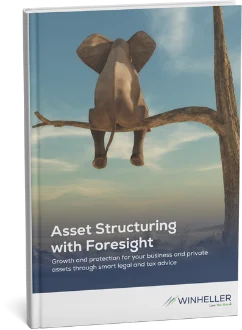Tax-optimized Asset Growth With Cryptocurrencies in Germany
The German state has a veritable interest in subjecting to taxation income generated from assets that entail an increased capacity of the taxpayer. Investment income is therefore typically taxed. However, this stands in the way of the unhindered growth of your assets.
Therefore, it seems reasonable to think about how to reduce tax access and to consider tax-optimizing arrangements. Planning wisely in this manner brings a reward of greater wealth at a later time.
Various design options for crypto assets
With regard to saving on taxes in the context of your investments in cryptocurrencies, the options available to you depend on your specific case. The design options are varied, and each case is different.
Below we have listed a few examples of possible tax optimizations that many of our clients find helpful. Our crypto experts will gladly discuss with you in person whether these can also be applied to your case or whether entirely different approaches are advisable. We will also work with you to develop individual solutions to allow your crypto assets to grow undisturbed.

Tax-free gains after one-year holding period
Germany is a crypto tax paradise - at least for HODLers. Surely you are aware that you can sell cryptocurrencies after a holding period of one year without having to pay tax on the gains.
Quite a few of our clients therefore deliberately move their tax residency from abroad to Germany in order to be able to sell their cryptocurrencies here tax-free.
Use losses for tax purposes
The crypto market is not a one-way street. When prices go south quickly, it's time to think about the tax value of losses. Losses can, in principle, be applied towards taxes and thereby reduce your remaining tax burden.
- A loss of EUR 100,000 is painful, but, if it has already occurred, you should at least benefit from it fiscally. At a personal income tax rate of 42 percent, a loss of EUR 100,000 is worth EUR 42,000. However, you can only claim the loss if this is realized within the one-year holding period.
- Do you continue to believe in the coin that caused you the loss? This does not prevent you from claiming the losses you incurred. However, you have to convert them into money, i.e. sell your coins at a loss. Later, of course, you can buy them again if you expect future price increases.
Single wallet or multiple wallets?
Let's assume you bought 20 ETH in January and sold it at a profit in November. Since the one-year holding period has not been observed, you would have to pay tax on the profit made.
However, let's assume that you have already bought 20 ETH in August of the previous year, but they are in a different wallet. Then it would be convenient if the sale would apply to these 20 ETH from August. This is because the holding period would have expired in this case and the gain on sale would be completely tax-free.
This is exactly what is possible with the multiple wallets option. Some software programs allow a "wallet-wide" view of your portfolio. In individual cases, this can mean a large tax saving. In other cases, however, it may make sense to split the crypto assets between different wallets and save taxes in the "single wallet" mode.
FiFo or Lifo?
As a crypto investor, you should be aware of the different calculation methods that are used when it comes to calculating the profit or loss you have earned.
- The LiFo method - short for "last in, first out" - assumes that the last coin acquired was sold first.
- In contrast, the FiFo method ("first in, first out") assumes that the coin acquired first was the coin sold.
For example, a trader who bought a BTC for EUR 30,000 in January and sells a second BTC for EUR 40,000 in November and then a BTC for EUR 50,000 in December will achieve very different results depending on the method used:
- If the FiFo method is applied, the profit would be EUR 20,000 (EUR 50,000 - EUR 30,000).
- With the LiFo method, it would only be EUR 10,000 (EUR 50,000 - EUR 40,000).
- If the first BTC had already been acquired in November last year, the capital gain would even be completely tax-free when applying the FiFo method due to the elapsed holding period of one year.
It is therefore worthwhile to "play" with the different methods and then convince the tax office of the correctness of the calculation method. You can learn more about FiFo vs. LiFo here.
Trading GmbH instead of income at private level
For crypto investors who actively trade and do not hold their coins for long periods of time, the establishment of a trading limited liability company (GmbH) makes sense. In this, crypto profits are only taxed at about 30 percent (instead of up to 45 percent in private assets). Tax access is restored only in the case of distribution of the profits to the shareholder. It therefore makes sense to retain profits over a period of years in order to reinvest them. Assets can thus grow much faster due to lower taxation.
Another great advantage: Crypto investors who trade in crypto derivatives and futures can now only offset losses in the amount of EUR 20,000 per year. However, this restriction on offsetting losses does not apply with respect to the trading company. You can find all the information about a trading limited liability company here.
Moving abroad
In some cases, moving to low-tax foreign countries can also be interesting, particularly for active traders. Since the turn of the year 2021/2022, the requirements for a (fiscally) successful departure have once again been significantly raised by the German legislator.
One thing is clear: Such a move affects much more than just tax issues. Important points to clarify before thinking about moving away include, for example:
- Do I have school-age children?
- Am I willing to give up my private environment in Germany and limit it to a few visits a year?
- Does my spouse support the plan?
- Will I be disciplined enough to scrupulously adhere to the precise requirements of tax law (e.g., number of days I am allowed to spend in Germany, giving up my residence in Germany, etc.)?
- Will I feel at home abroad?
- Can I imagine living abroad in my old age, or will I be drawn back again one day?
WINHELLER is also the partner at your side when it comes to exit taxation.
Your advisors for the tax optimization of your crypto assets
Would you like to learn how to optimize your crypto assets for tax purposes? Would you like to ensure you know all the design options? We are happy to support you!
You can reach us by e-mail (info@winheller.com) and by phone (+49 69 76 75 77 85 22).
Do you need support?
Do you have questions about our services or would you like to arrange a personal consultation? We look forward to hearing from you! Please fill in the following information.
Or give us a call: +49 69 76 75 77 85 22








